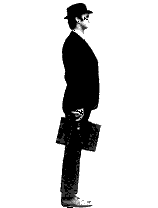The conversation between Stanislavsky and Michoels about the fight of a bird, how does it begin. "No, answered Stanislavsky, before bird stretches the wings, it needs 'free' breathing, the lungs full of air -- and then the bird becomes proud and could fly." This bird is actor, of course.
Yes, yes... the goodbye.
I hope that I connected it right; in Film Directing I have only one page on actors and acting (no special course "Acting for the Camera). The same with the Stagematrix: Theatre directing -- I keep saying take acting classes, we have no time to talk about "how to work with actors"...
There a couple way to go from here: directing, and -- Theatre Theory; The Book of Spectator (I presume that you already went through the Script Analysis pages by now).
Summary
I moved and keep moving most interesting issues into Theatre Theory directory. Yes, "acting" is a part of the Virtual Theatre files (the future of theatre). Yes, there are even more complex topics connected with Method Acting, but they are not for class...
The Possessed

Questions
You have to have questions, because all what you do on stage is posing the questions for the public to answer! The difficult ones are the best. The questions they have no answers. The questions they ask themselves every day, their entire life! Do you know those questions? No? How come? Didn't you come on stage from the house? I thought that you are the most active active spectator, the one who needs answers so bad that he got on stage...Notes
Glossary for "Theology & Method," in Russian (see Theatre Theory Directory).
I ask in class: do you have a list of your problems? As an actor, do you know what is not under your control? Do you know your shortcomings? You should. Write it down. It's easy, if you do it for every character you are working on. If you keep the long of your problems, you will learn how to stay focused, how to have big targets, how to work on yourself.
Do you know why you do not have this list?
Because you have no habit of taking notes. You are not ready for acting profession.
Actingland.com - Acting resources, career guides, and casting information.
2005 * After so many years of webbing I cannot change the nature of my webpages -- they are what they were from the start; notes, thoughts, points I make for myself for classes and productions. Do they have an independent existence? Maybe, somewhere in the future...
2005 updates: Small Chekhov Fall * "Four Farces & One Funeral" -- Chekhov.05
Chekhov's one-acts are updated -- The Bear, The Proposal (1st act -- Oh, Love!), Wedding, Tobacco (Act II -- Ah, Marriage!), but I'm still working on the "funeral" (Last Day of Anton Chekhov). mini-chekhov
I am teaching DramLit -- groups.yahoo.com/group/dramlit (subscribe) and see THR215 for subjects, topics, titles.
Spring 2006 -- Waiting for Godot, Beckett -- new pages ( see shows )
TALENT
Talent is not easy to define or dissect. . . . Talent is often buried deep . . . and difficult to evoke.
Talent is the felicitous combination of many creative capacities in a person, governed by his generative will.
Technique exists above all for those who possess talent [and] inspiration. . . . It serves consciously to stimulate super conscious creativity. The more talent the actor has the more he cares about his technique.
A true creative state while on the stage, and all the elements that go to compose it, were the natural endowment of Shchepkin, Ermolova, Duse, Salvini. Nevertheless, they worked unremittingly on their technique. . . . Inspiration came to them by natural means almost every time they repeated a role, yet all their lives they sought an approach to it.
In our art it is very dangerous to mature too rapidly . . . without determined effort. . . . A talent may be no more than a pretty toy rattle. Talent includes physical attributes . . . memory, imagination, sensitiveness, impressionability. . . . A person may be ugly in real life . . . but fascinating on the stage, and that is better than being beautiful. One may have only a modicum of various qualities but make a powerful effect if possessed of stage charm. On the contrary a much larger talent may be utterly ineffective, lacking the power to attract. --Building a Character
-- Collected Works, Vol. V
2006:
... 2007-2008
Summer 2010 :




